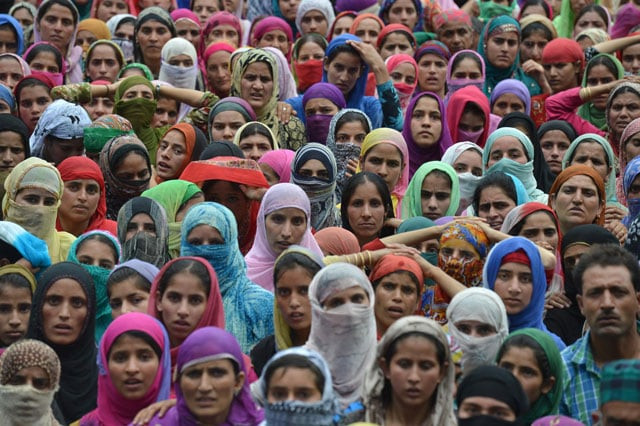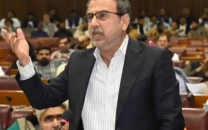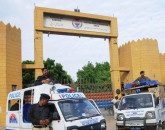A year of trauma, resilience taking its toll on Kashmiri women
Mushaal Mullick says Kashmiri women are being persecuted at a different level of tyranny

It has been a year of suffering, trauma, fear, uncertainty and wrath of occupation forces since they laid the siege of Indian Illegally occupied Jammu and Kashmir (IIOJK).
It has been the hardest year for the Kashmiri people in general and for the women in particular since Indian occupation. Usually the Kashmiri men are targeted, but the women are also suffering from the Indian military siege in their own less visible yet painful way.
On August 5, 2019, Indian Prime Minister Narendra Modi’s Hindu-nationalist government stripped the IIOJK of its special constitutional status by abrogating Articles 370 and 35-A that gave the occupied state a degree of autonomy within the Indian state.
Now it is under the direct rule of the central government with a nominal state legislature. This blatant move helped Modi place the Muslim-majority region under a massive security siege, which has now completed a year and ever since the life of an ordinary Kashmiri has been a struggle.
Amid all the chaos and unjust moves by the Indian government that turned the Valley into a war-trodden region, the resilient Kashmiri women are now the biggest victim of Indian military siege.
According to the latest statistics by Kashmir Media Services, the Indian troops molested and gang-raped 32 Kashmiri women during the period from January to June 2020 alone. The rape has been the oldest war weapon, which is being used against the unfortunate Kashmiri women in the IIOJK when they are locked down in their own homes.
During the same period, five women have been widowed as their husbands were abducted and then killed by the tyrant occupation forces.
A very well-known face of Kashmir’s freedom struggle, Mushaal Mullick, who is also the wife of Hurriyat leader Yasin Malik and Chairperson of Peace and Culture Organisation, told APP that the Kashmiri women were being persecuted at a different level of tyranny.
“Rape is being used as a weapon of war and India is systematically using this to suppress the freedom struggle of Kashmiri people. Children are being tortured and pelleted. It’s an ideal opportunity for the world to focus on the victims and expose the fascist face of India,” she said.
She added that communication blackout and the Indian military siege were affecting the mental health of women, whose sons and husbands were being abducted and taken to unknown places, and they had to face the burden of navigating India’s tiring legal system to seek the release of their loved ones.
Families and mothers of detainees had to visit several jails to find where their sons had been put up. “This practice takes its toll on both the physical and mental health of helpless women. They are also facing health problems as many pregnant women have to walk for miles in order to seek medical assistance due to the forced closure of hospitals in the Valley,” she regretted.
Sharing her experience of being a single parent, while on this strong pursuit of freedom, Mullick said that her daughter missed her father on every Eid and birthday just like many other Kashmiris’ daughters, who had lost their fathers at the hands of Indian military.
“It’s been more than six years since my daughter and I saw my husband Yaeen Malik. I have to make my daughter a strong human being. I tell her about the hardships of other children to make her realise this is our life-long struggle and we are not alone in this,” she added.
Chairman of the Self-Determination Forum J&K, Islamabad chapter Abdul Hameed Lone said the restrictions imposed by the Indian government had taken a heavy toll on access to healthcare. Women and children continued to face daily trauma in the face of several hundred thousand Indian soldiers deployed in the Valley.
He said the Indian occupational forces and Indian agencies had captured and disappeared about 10,000 Kashmiri youth and children in the IIOJK since 1990 and it had become a never-ending practice during the last year since August 5.
“Abduction of young boys and men by the Indian agencies was on the rise in the occupied Valley. The situation will worsen as August 5 is nearing and the Indian government will have to face resistance forces upon completion of one year of the military siege,” he said.


















COMMENTS
Comments are moderated and generally will be posted if they are on-topic and not abusive.
For more information, please see our Comments FAQ